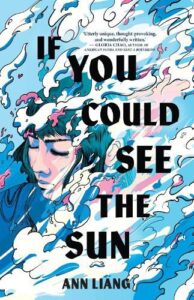‘If you could see the sun’ a review by Lee Poole

“Captivating, heart-fluttering, and electric.
After hours of wracking my brain for the perfect string of adjectives to describe Ann Liang’s debut novel, If You Could See the Sun (2022), this was the trio I landed on. It is a splendid blend of fantasy and romance that makes your heart race with adoration and tension, an enjoyable read that even got me back into reading.
Among the elite student body of Airington Boarding School, there is one student not like the others; Alice Sun — a girl without identity, half of herself in the two polar countries of America and China, and the ability to turn completely invisible, spontaneously, and not at her own will. Through this newfound power, she begrudgingly goes into business with her academic rival, Henry Li, to keep her hard-earned scholarship in the elite academy.
The novel begins in a restaurant somewhere in Beijing, Alice wondering what under what unfortunate circumstance her family has invited her out to eat — coming from a financially disadvantaged background, eating at a restaurant is reserved for big news: “someone’s dead”, “it’s someone’s birthday”, or “they have a life-changing announcement” (and on the rare occasion it’s all of the above). Just as Alice predicts, there is a big announcement: her family can no longer afford the tuition for half-scholarship, meaning she either must go to a local school or find an extra 165,000 RMB every year. She quickly realises the latter is only a fantastical outcome with an infinitesimal possibility of coming true, evident as her mother’s arms are loaded with plastic bags filled with all the leftovers from the restaurant.
Alice makes her way from the colourful Third Ring Road, which directly juxtaposes the acclaimed Airington Boarding School, with balding uncles lazing about and purposeful aunties striding to the open markets. Liang uses a judicious range of vivid adjectives to beautifully illustrate both the packed streets of Beijing and the clean, modern aesthetic of the Boarding School. Whilst her journey to school is littered with “winding alleys clogged with rickshaws and vendors,” and “calligraphed Chinese characters blinking across neon signs” on the fronts of run-down noodle and convenience stores, Airington feels like a different world. It aims to be a charming “blend of Eastern and Western, old and modern,” but through the lens of Alice, it is more of a disregarded mismatch, like an abandoned set of “those ancient Chinese costume dramas.”
And in the awards ceremony of an academy where only those fortunate enough can dare to attend, we are introduced to the wealthy, charming and downright cocky Henry Li, school heartthrob and Alice Sun’s solitary rival, someone she has unconditionally had to share the spotlight with. The romantic lead is the definition of untouchable, and the epitome of being leagues above, well, everyone else. Have you ever walked into a room to see everyone waving at you with beaming smiles, only to turn around and find that their attention is on someone else? This is every day for Alice, and it makes her feel invisible every time.
As fate would have it, in the hubbub of the austere halls of Airington, she finds herself completely transparent, unsubstantial, invisible. Alice Sun, a girl whose entire identity revolves around being seen for her academic achievements, is now unseen, and it is completely uncontrollable. And that closes the first chapter, with the lingering taste of bewilderment and urgency.
Ann Liang’s fantasy world deals with the themes of identity and class, among others, in a beautifully sentimental and gut-wrenching book about family, love and making a place for yourself in a world that seems to constantly discourages us from doing so. Alice Sun is your typical high-flying over-achiever, who (with the caveat of her rival and love interest) is unmatched in her literary abilities, yet no matter what number of accolades she accumulates, she is not satisfied, because she recognises that wherever she goes, she does not know where she belongs. She grew up in China, yet only has “primary school-level Chinese skills,” so she gets faced with scrutiny by her peers. In America, where she moved to at seven years old, she feels almost too seen as the ‘Asian kid,’ not native to the West, thus instantly excluded. Home does not feel like home and her home-away-from-home is rife with hostility and poverty.
If You Could See the Sun is a captivating coming-of-age novel that I ate every single word of. Even on my third read, I cannot get over Henry Li, and his interactions with Alice have my heart fluttering. Whilst a simple concept, Alice’s unusual situation and relationships felt real, alive, and electric, and I could not suggest a better young adult book from these recent months. It is comforting yet intense, and a delightful book to read in the warm glow of your room, to remind you of the heart-warming values of love, family and loving yourself.”
